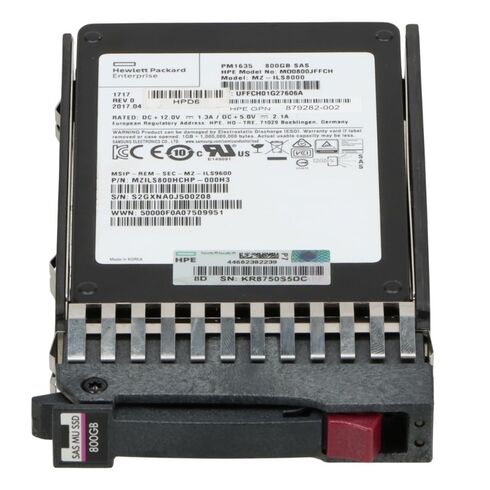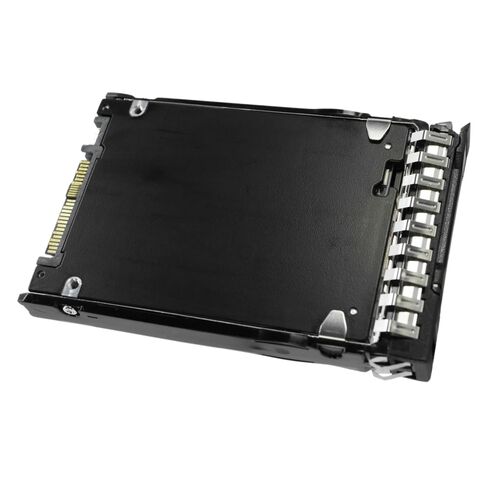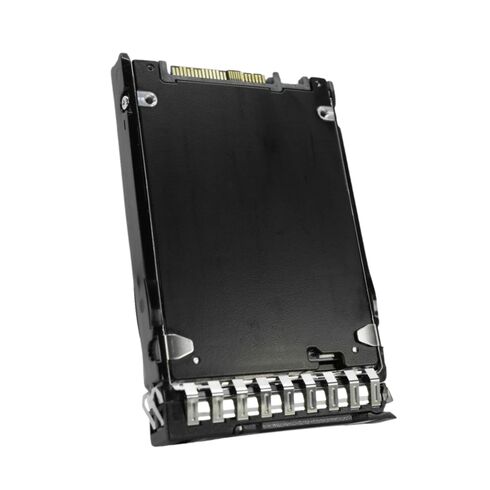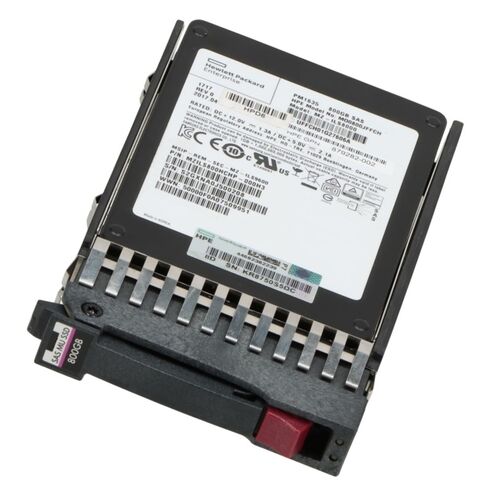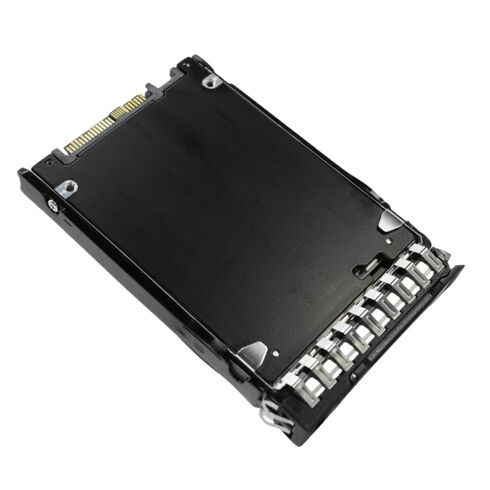P49745-001 HPE SSD 800GB SAS-24GBPS SFF Mixed Use
- — Free Ground Shipping
- — Min. 6-month Replacement Warranty
- — Genuine/Authentic Products
- — Easy Return and Exchange
- — Different Payment Methods
- — Best Price
- — We Guarantee Price Matching
- — Tax-Exempt Facilities
- — 24/7 Live Chat, Phone Support
- — Visa, MasterCard, Discover, and Amex
- — JCB, Diners Club, UnionPay
- — PayPal, ACH/Bank Transfer (11% Off)
- — Apple Pay, Amazon Pay, Google Pay
- — Buy Now, Pay Later - Affirm, Afterpay
- — GOV/EDU/Institutions PO's Accepted
- — Invoices
- — Deliver Anywhere
- — Express Delivery in the USA and Worldwide
- — Ship to -APO -FPO
- — For USA - Free Ground Shipping
- — Worldwide - from $30
Same product also available in:
| SKU/MPN | Warranty | Price | Condition | You save |
|---|---|---|---|---|
| P49745-001 | 1 Year Warranty | $645.00 | Factory-Sealed New in Original Box (FSB) | You save: $225.75 (26%) |
| P49745-001 | 1 Year Warranty | $414.00 | Excellent Refurbished | You save: $144.90 (26%) |
Product Snapshot HPE P49745-001 NVMe-Class SAS SSD (800 GB)
High-performance, hot-swappable storage engineered for enterprise-class HPE ProLiant Gen10 Plus systems. This 800 GB solid state drive pairs durable TLC flash with a compact 2.5" SFF profile and a 15 mm height, delivering an optimal balance of throughput, IOPS and endurance for mixed workload environments.
General Information
- Manufacturer: HPE
- Manufacturer Part Number: P49745-001
- Product Type: 800 GB solid state drive
Key Technical Specifications
Capacity & Physical
- Usable Size: 800 GB raw capacity (flash-based SSD).
- Form Factor: Small Form Factor (2.5" SFF), 15 mm profile — fits dense server trays.
- Interface & Connector: SAS (Serial Attached SCSI) rated at 24 Gbps per port.
- Hot-Swap Ready: Hot-plug capable with a carrier assembly for tool-less insertion/removal.
Flash & Power Details
- Flash Type: TLC (Triple-Level Cell) NAND — cost-effective with strong performance for enterprise workloads.
- Carrier/Plug: Hot-plug carrier included for rapid serviceability in rack servers.
- Typical Power Draw: Approximately 8.56 watts under standard operation.
- Endurance Rating: Lifetime writes up to 4,380 TB total bytes written (TBW), suitable for sustained write-intensive tasks.
Random I/O Performance
- Random Reads: Up to 124,000 IOPS — accelerates database queries, virtualization boot storms, and high-concurrency reads.
- Random Writes: Up to 118,000 IOPS — supports transactional workloads and write-heavy OLTP applications.
Compatibility & Integration
Server Compatibility
- Validated for HPE ProLiant Gen10 Plus server platforms — plug-and-play with HPE firmware and management stacks.
- Works with standard SAS backplanes and HPE storage controllers that support 24 Gbps SAS links.
Choose This HPE SSD
Reliability & Durability
- Engineered for enterprise uptimes — robust TBW rating and enterprise-grade firmware reduce downtime risk.
- Hot-plug capability enables live maintenance and quick drive replacement without powering down systems.
Deployment Scenarios
Optimized Workloads
- Virtualization Hosts: Accelerates VM boot times and reduces latency for many small random I/O operations.
- Databases & OLTP: Handles high IOPS demands and frequent writes typical of transactional databases.
- Cache/Tiering Layers: Serves as a fast tier for hot data in hybrid storage pools, improving overall system throughput.
- Content Delivery & Media: High sequential bandwidth supports large file streaming and media transcode operations.
Enterprise Environments
- Data center deployments requiring high-availability, predictable latency, and enterprise manageability.
- Blade and rack servers where density and hot-swap servicing are priorities.
Feature Breakdown
Physical & Interface
- Form Factor: 2.5" SFF, 15 mm
- Interface: SAS, 24 Gbps
- Hot-Plug: Yes (carrier included)
Durability & Power
- Endurance: up to 4,380 TBW
- Power Consumption: ~8.56 W (operational)
HPE P49745-001 800GB SAS Mixed Use SSD Category Overview
The HPE P49745-001 800GB 2.5-inch SFF SAS-24Gbps Mixed Use BC Multi-Vendor Hot-Plug Solid State Drive with tray for HPE Gen10 Plus servers represents a high-performance, enterprise-grade storage option designed for modern data center workloads. This category page focuses on drives of this exact specification and closely related SKUs: 800GB capacities (and near-capacity siblings), 2.5" small form factor (SFF), SAS interface at 12Gb/s or 24Gb/s (here emphasized as SAS-24Gbps), mixed-use endurance profiles, multi-vendor/backward compatibility (BC) considerations, and hot-plug ready trays optimized for HPE Gen10 Plus server platforms.
Characteristics and What They Mean
Form Factor: 2.5" Small Form Factor (SFF)
The 2.5-inch SFF form factor strikes an ideal balance between high-density server storage and thermal/airflow design. In rack servers, SFF drives allow administrators to populate more drive bays per chassis compared to 3.5" options, increasing total usable capacity and IOPS per rack unit. For the HPE P49745-001 class, SFF trays are standardized to fit Gen10 Plus carrier slots, enabling easy insertion and removal without tools.
Interface: SAS-24Gbps (Serial Attached SCSI)
SAS at 24Gbps delivers robust throughput and enterprise features not always present in consumer interfaces. SAS controllers provide dual-port connectivity, better error recovery, advanced SCSI command support, and typically more predictable latency under sustained I/O. This makes SAS-24Gbps ideal for mixed-use SSDs expected to serve both read- and write-intensive workloads in virtualized environments, databases, and caching layers.
Capacity: 800GB — Right-sized for Mixed-Use Workloads
An 800GB capacity is often chosen when balancing cost-per-GB against performance and endurance requirements. In RAID groups, 800GB drives allow predictable rebuild times and manageable TBW (terabytes written) characteristics for mixed-use endurance profiles. They frequently appear in tiers where low latency is required but large bulk capacity is handled by HDD tiers or higher-density NVMe arrays.
Drive Class: Mixed-Use (MU) and Endurance Considerations
The mixed-use designation indicates that the drive is engineered for workloads with a blend of reads and writes — for example, virtual desktop infrastructure (VDI), general-purpose database services, and mixed application servers. Manufacturers rate MU SSDs for a TBW or DWPD (drive writes per day) level that sits between read-optimized and write-intensive products. When planning capacity and expected write amplification, selecting the correct endurance class preserves warranty and ensures predictable lifecycle costs.
Compatibility and Multi-Vendor
HPE Gen10 Plus Server Tray and Firmware Matching
This category emphasizes drives sold with HPE-compatible trays and firmware compatibility statements. HPE Gen10 Plus servers use sleds and drive carriers that include backplane alignment, LED indicators, and mechanical latch points; drives bundled with the correct tray simplify deployment. Always verify firmware compatibility for full support: vendor firmware optimized for HPE hardware typically enables SMART attributes, drive health telemetry, and predictive failure alerts integrated into HPE management tools.
Multi-Vendor Interoperability: What To Check
- Controller compatibility — ensure the server's SAS controller supports the nominal SAS speed and multi-lane configurations.
- Drive firmware ID — confirm that the drive firmware is accepted by HPE management agents and will not be blocked by compatibility filters in service processors.
- Tray pinout and carrier latch — mechanical fit is mandatory; even physically identical trays can differ in backplane alignment.
- Power and thermal profile — multi-vendor drives must meet the same power envelope to avoid overheating in dense enclosures.
Hot-Plug Functionality and Serviceability
One of the defining features of this category is hot-plug capability. Hot-plug SSDs allow replacement or upgrade while the server remains online (subject to best practice procedures), drastically improving availability for critical services. Hot-plug trays with clear activity LEDs and secure latches further reduce human error during field swaps.
Deployment Scenarios and Recommended Use Cases
Virtualization Hosts and Hyperconverged Infrastructure
HPE P49745-001 class drives are commonly used as the performance tier in virtualization hosts — caching OS images, hosting VM boot volumes, and providing responsive IOPS to many small VMs. In hyperconverged infrastructures (HCI), mixed-use SSDs balance the needs of both storage and compute-centric workloads while enabling faster VM boot storms and better responsiveness for multi-tenant environments.
Database Acceleration and Log Storage
For OLTP databases with mixed read/write profiles, MU SSDs deliver the reduced latency and sustained IOPS necessary for consistent transaction throughput. They are also well-suited for write-intensive log files when used with appropriate RAID configurations and periodic background maintenance windows to manage rebuild loads.
Tiered Storage Architectures
In tiered storage, 800GB MU SSDs serve as an effective middle tier: faster than disk for hot data and more cost-effective than NVMe for larger capacity within the SAS domain. Policies can move cold data to HDD or object storage while keeping frequently accessed objects on the MU SSD tier.
Storage Architecture and RAID Considerations
Choosing RAID Levels for Mixed-Use SSDs
RAID selection depends on desired tradeoffs among capacity efficiency, fault tolerance, and rebuild time. For mixed-use SSDs:
- RAID 1/10: Best for critical performance tiers where rebuild speed and write amplification must be minimized.
- RAID 5/6: Offers more capacity efficiency but can lengthen rebuild duration and increase write amplification — ensure your controller supports SSD-optimized rebuild algorithms.
- Erasure Coding: In software-defined stacks, erasure coding can provide capacity-efficient redundancy but requires careful network and compute provisioning to avoid performance degradation during rebuilds.
Rebuild and Failure Domain Planning
SSD rebuild times are typically faster than HDDs, but dense enclosures with many drives still introduce rebuild risk. Design failure domains (chassis, rack, power bus) to minimize correlated failures and accelerate repair. Where possible, stagger firmware updates and maintenance windows to avoid simultaneous interrupts to multiple drives in a logical RAID set.
Environmental Considerations
Power Envelope and Cooling Requirements
Enterprise SSDs draw more power under sustained writes and can raise ambient temperatures in high-density trays. Ensure proper chassis airflow and that downstream cooling can handle peak drive power draw. Confirm power and thermal specifications for multi-vendor options to avoid overtaxing backplane power budgets.
Data Center Environmental Best Practices
For reliability, maintain recommended operating temperature ranges, avoid rapid thermal cycling, and plan for dust and particulate control. Drive health can be sensitive to prolonged exposure above max operating temperatures, which accelerates wear and increases failure probability.
Additional Technical Details to Include in Product Pages
SMART Attributes and Vendor Telemetry
Detail available SMART attributes (e.g., media wear indicator, uncorrectable error count) and explain how they integrate with HPE iLO and system health dashboards. Provide example alert thresholds and recommended action steps for thresholds that indicate approaching end-of-life.
Physical and Environmental Specifications
Include numbers for operating temperature range, shock and vibration ratings, endurance (TBW), Mean Time Between Failures (MTBF) if available, and power consumption at idle and under load. These figures are important for capacity planning, thermal design, and rack-level power budgeting.

